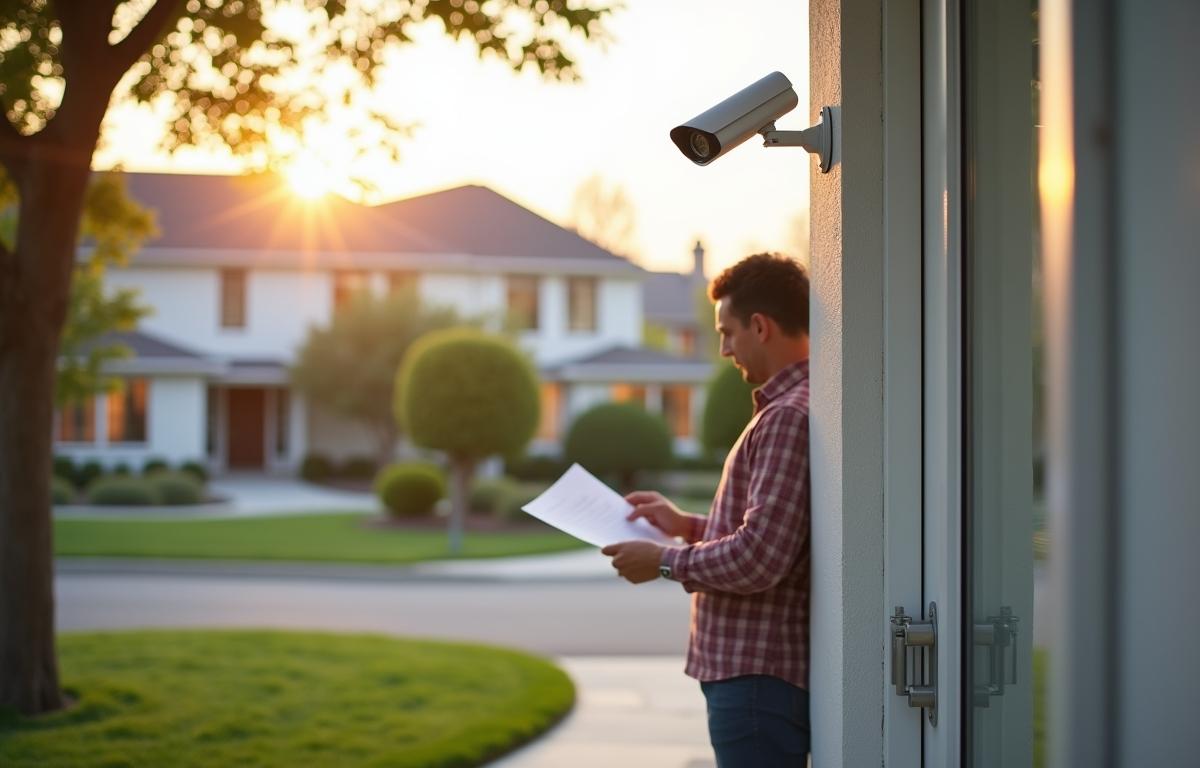When installing cameras, many overlook the important legal aspects of home security. Many homeowners get excited about the convenience of remote monitoring and the extra layer of protection. Yet, they sometimes forget that surveillance has legal implications. If you’ve ever wondered how to keep yourself on the right side of the law while safeguarding your home, it’s worth diving into the rules and regulations that surround camera usage. By understanding your responsibilities and rights, you’ll avoid potential conflicts with neighbors and protect your own peace of mind.
Most of the time, people are unaware of the specific ordinances that could affect them. Local laws often change, and certain regions impose stricter measures than others. Keeping pace with these developments can help you stay informed and prevent unintentional breaches of privacy. Whether you’re placing cameras inside or outside your home, it’s key to recognize that you’re dealing not just with security, but also with privacy laws in many jurisdictions. Doing your homework first will let you enjoy the technological benefits of modern camera devices without inviting unwanted legal trouble.
Contents
Key Regulations for Home Security Cameras
Understanding local and national regulations is crucial if you plan on installing home security cameras. Each country and sometimes each state has its own set of rules, so there’s no one-size-fits-all approach to compliance. In many areas, it’s legal to record video on your own property. However, most jurisdictions draw the line at capturing audio or visual footage in spaces where someone has a reasonable expectation of privacy.
Private vs. Public Areas
Private spaces include areas such as bathrooms, bedrooms (when dealing with renters or guests), and shared living spaces that are not publicly visible. Several regions make it illegal to place cameras in parts of your home that these individuals might use without their consent. Public areas, like front yards or driveways, often have fewer restrictions because people have less expectation of privacy there. However, even when cameras face the street, some laws restrict how much can be recorded if you’re capturing parts of your neighbor’s house.
Audio Surveillance Complexities
Audio recording triggers extra legal scrutiny in many locations. While video in public spaces is usually acceptable, wiretapping laws or consent requirements for audio vary significantly. Some places only require single-party consent, which allows you to record if at least one individual in the conversation knows about it. Others require all parties to be informed. Violating these requirements can lead to hefty penalties, so it’s wise to check your region’s statutes before enabling any microphone feature on your camera system.
Home Security Cameras and Privacy Rights
Privacy rights frequently enter the conversation whenever someone sets up a surveillance device. Neighbors may worry about intrusion if they see cameras pointed in their direction. Someone coming to your door might also have questions about how much is being recorded. The good news is that laws aim to balance your right to security with the privacy rights of others.
Communicating with Neighbors
It’s often a good practice to talk with any neighbors who might appear in your camera’s field of view. Reassure them that the primary focus is your property and security, not theirs. This courtesy can go a long way in preventing disputes. In some circumstances, simple adjustments to your camera angle could end up resolving potential tension. If you want to avoid confrontation, a polite conversation and minor camera tweaks can create a more comfortable setup for everyone.
Storing Footage Responsibly
Data protection laws increasingly apply to the storage and handling of video recordings. In certain countries, you must inform individuals if you intend to keep personal data, which in this case includes images or audio of them. Even if it’s your own property, you may face restrictions on how long you can store the footage. Overly long retention periods can trigger legal scrutiny. Regularly deleting unnecessary clips and securing your recorded content against unauthorized access can keep you compliant while also ensuring personal privacy is respected.
Permissions and Consent
Whenever cameras capture areas beyond the immediate confines of your yard, obtaining some form of consent may be necessary. This can be explicit or implied, depending on local regulations. Commercial properties often must post signboards indicating that surveillance is active. Residential areas don’t always require signage, but it can still be a good idea as a way to notify guests or service personnel that they may be recorded. Transparency helps reduce the chance of misunderstandings.
When Written Consent Matters
Written consent becomes particularly relevant if you’re filming areas where visitors or tenants might have a reasonable expectation of privacy. For instance, landlords who install security cameras in shared residential buildings often must inform tenants. Some might even need a written agreement confirming that everyone involved understands the camera’s location and purpose. Failure to follow such protocols might lead to tenant complaints or even legal action. While not all situations demand written confirmation, it’s smart to document any agreement where confusion might arise later.
No matter how careful you are, disagreements with neighbors or visitors can happen. Perhaps a camera inadvertently caught a private conversation or angled into someone else’s yard. Even if you took steps to avoid capturing anything sensitive, certain people might still feel uneasy. Knowing how to handle these disputes can keep minor issues from escalating.
Creating an Open Dialogue
If someone raises a concern about your cameras, try not to dismiss it. A cooperative approach can help de-escalate tension quickly. Listen to their worries, explain the purpose of your security system, and discuss any possible adjustments to camera placement. People often appreciate knowing that their concerns are heard, and this open dialogue might prevent official complaints or legal follow-up.
Seeking Mediation
When conversations don’t settle the dispute, mediation can be a more calming route than going straight to court. This allows everyone to express their viewpoint with the help of a neutral third party. Many neighborhoods and municipalities offer mediation services or community boards that function in a similar way. If the conflict persists or becomes more serious, getting a legal opinion might be beneficial. This step can clarify whether your setup actually violates any local laws, providing a clear path forward.
Some people mount cameras that face public sidewalks or streets beyond their property line. Generally, what’s in public view can be recorded. However, local jurisdictions can impose limits if the footage captures extensive details like audio or includes license plates and faces that could be used to identify individuals. When a camera is aimed at a shared hallway in an apartment building or a communal area, the rules might differ significantly from those pertaining to a single-family home.
Balancing Security with Respect
Finding the right balance between security and respect for others’ privacy is a nuanced task. The best approach usually revolves around limiting your cameras’ focus to what you absolutely need to see. You’ll still get a clear view if something suspicious happens near your driveway or porch, while reducing any sense of intrusion felt by passersby. Modern security systems often allow setting specific motion zones, so you record only when movement happens in designated areas.
Handling Footage During Disputes or Investigations
If your recorded video becomes part of a legal investigation, you may be asked to present it as evidence. That can be helpful for law enforcement, but it also opens the door for scrutiny regarding how and why the footage was collected. In certain cases, improperly obtained video could be deemed inadmissible. By establishing a clear and legal process for recording from the start, you’ll strengthen the credibility of any evidence you share.
Retention Policies
Regularly reviewing and deleting unnecessary recordings helps reduce data liability. Some homeowners only keep footage for a week or two, which is often enough time to identify any suspicious activity that happened on the property. Shorter retention schedules also respect the privacy of those recorded and count as a good-faith effort if privacy complaints surface. Make sure to maintain secure backups so no unauthorized individuals can access or alter your saved files.
Common Pitfalls to Avoid
Homeowners sometimes forget to deactivate audio recording when they set up their cameras. Others claim to use their devices only for home protection but end up focusing them on neighbors’ windows or yards. These pitfalls can turn a well-intentioned security measure into an invasive practice.
Another frequent mistake is neglecting to check if the camera software automatically uploads footage to a cloud server located in another jurisdiction. In some regions, transferring data across borders triggers additional legal requirements. Doing your research before finalizing your camera setup will spare you from these headaches.
It’s also important to avoid installing hidden or disguised devices. Covert recording brings a whole new level of legal risk because it implies an attempt to capture footage without the knowledge of those being filmed. Courts generally do not favor stealth surveillance methods, especially in non-emergency contexts. If you want to protect your property, a camera placed in plain sight is typically enough to deter most potential intruders.
Finally, keep in mind that you should always stay updated on evolving regulations. Legislation related to privacy and technology frequently changes. By staying aware of these shifts, you’ll remain compliant and safeguard your interests for the long haul. Making an effort to stay within the boundaries of the law ensures that your home security cameras serve their primary purpose: to keep you and your loved ones safe without trampling on others’ rights.
“`





